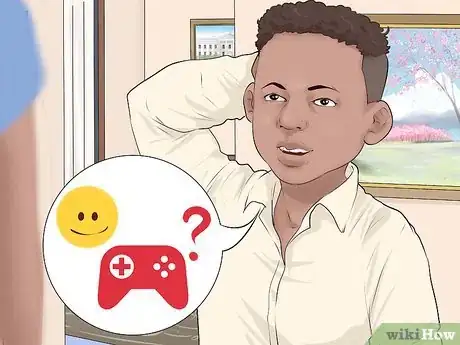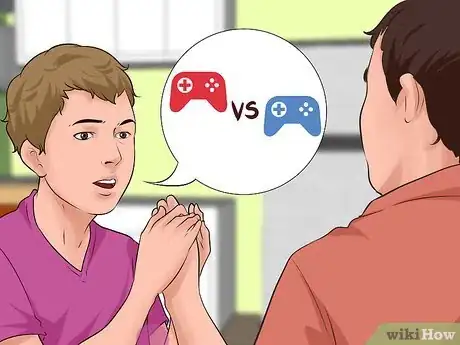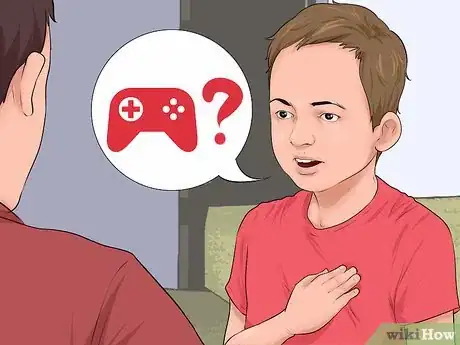This article was co-authored by Wits End Parenting. Wits End Parenting is a parent-coaching practice based in Berkeley, California specializing in strong-willed, “spirited” children with impulsivity, emotional volatility, difficulty “listening,” defiance, and aggression. Wits End Parenting's counselors incorporate positive discipline that is tailored to each child’s temperament while also providing long-term results, freeing parents from the need to continually re-invent their discipline strategies.
This article has been viewed 141,774 times.
Sometimes it can be difficult to talk your parents, especially when you have to ask their permission for something. If your parents make you ask for permission to play a game, then you have to be very smart about how you approach them. Going about asking to play a game the wrong way can lead to an argument which can get your games taken away for a long time. It's important to always remember that it's just a game and your relationship with your parents is more important.
Steps
How to Make Your Parents Happy
-
1Meet their expectations. Keep your room clean. Do your homework. Finish any chores. Cover all the things your parents expect you to do beforehand. If you have a messy room and ask to play games, you will likely get a negative response. They will likely tell you to do whatever they have been bugging you to do first. Just get your duties out of the way so you can tell them everything is already done. Then they have no reason to say you don't deserve to play your game.
-
2Make your parents proud. This is where being a good student in school pays off. If you can manage to impress your parents in important areas of life, they are more likely to be lenient when you ask to do something you want.
- Even if you're not the best student, you impress them in other ways. Next time they have company over, be polite, sociable, and helpful with the food, drinks, and dishes. They will be so proud of how you behaved with their friends that they will try a little harder to make you happy too.
Advertisement -
3Make them feel appreciated. Before you ask for something, thank them for what they have given you already. For example, "Hey mom, I just wanted to say thank you for that game you got me. I've really been enjoying it. I think I'll go play for a little while now if that's okay with you." Your parents will be glad to hear that you appreciate what they do for you. Also, instead of trying to tackle the question head on, you've already asked them indirectly and in a polite way.
- Be sure you are sincere when showing your appreciation. If you sound like you are just saying it, your parents are likely to see it as a ploy.
- Make this method more effective by thanking your parents regularly. Don't just be thankful when you want to something. Showing regular appreciation will help build a better relationship which will make it easier to communicate when you want something.
How to Ask the Question
-
1Pick a good time. If you can tell your parents are very busy or not in a good mood, you are better off waiting to ask about playing your game.
- If you aren't sure whether or not it is a good time before asking about your game ask if they have a minute to talk or if they are too busy.
- If your parents tell you they are busy just let them know it's okay and you'll come back later. Don't put pressure on them to deal with you immediately, they may have something important that they are focused on.
-
2Ask nicely. Do not make a demand or whine to play your game. Asking nicely is as simple as saying please. You don't need to lay it on too thick by begging, just be polite. For example, you might try saying, "Could I please play my game for an hour before bed?" Your parents want to make you happy and let you do things, but if you are unable to ask nicely they may think it is a result of lenient parenting and decide to tell you no as a lesson.
-
3Let them know why you want to play. Sometimes getting a positive answer is as easy as explaining that you need a break too. Parents will understand your feelings. Maybe you had a rough day at school or just finished a lot of homework and need a little chill time to recover and relax. It makes it a lot harder to say know when you open up and they can really see how you're feeling.
-
4Consider an exchange. Offer to do something your parents want done in exchange for being able to play the game afterwards.[1] Maybe they have been bugging you to cut the grass, put away your laundry, or help with some kind of project around the house. They will very likely appreciate your willingness to pitch in and feel like they are getting the better end of the deal.
- See if your parents will set up a chore-reward system. They can create a list of things that need to be done each week and you can earn a set amount of game time for completing them. This way you know what is expected of you and can get the chores out of the way when you're feeling up to it.
-
5Invite them to take a break and hang out with you. Many parents do not play games, but some do. Even if your parents never play a game, it doesn't hurt to invite them to spend time with you. Some parents will be so excited to do something together with you they will agree, even if they don't like what it is.
How to Deal with a Negative Response
-
1Don't whine. Be friendly and respectful.[2] Even if they make you with their answer, don't call them names or run off to your room and slam the door. If you want your parents to respect your wishes and treat you like a person that is mature enough to make their own decisions, then show them that you are mature.
-
2Find out the reason behind their choice. Understanding why your parents said no will help you to make the changes in your approach that will lead to hearing yes the next time. Remember, your parents love you and want to say yes and make you happy. When they say no, they likely have a good reason.
- Try to change your parents misguided beliefs as to why you can't play. Find them out, change them.
- Maybe they just feel you've been spending too much time playing games and are worried it isn't healthy for you. Keep track of how long you have played each week and set down an amount of time with them.
- Your parents might see playing games as anti-social, since you are alone in your room playing them. Show them how most games involve interacting with other players online and often working together to accomplish a common goal. If they can see you are developing leadership skills or learning to be a team player, they might see your gaming in a new light.
-
3Don't give up. Show them you can be mature and find another constructive way to spend a little time. Read a book, help with dinner, or just talk with them. Ask again later in the evening when they may have seen enough of your good behavior to sway their decision.










































































